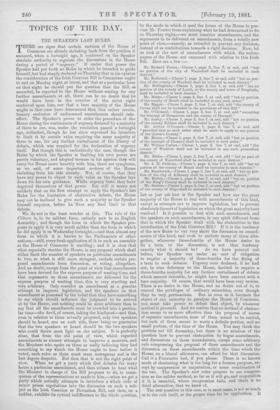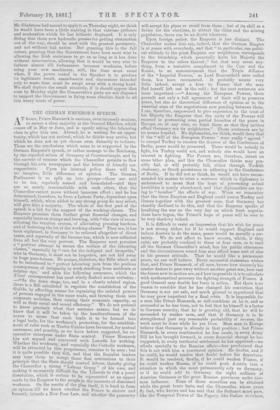TOPICS OF THE DAY.
THE SPEAKER'S LAST RULES.
THERE are signs that certain sections of the House of Commons are already shrinking back from the position it assumed, when a fortnight ago, it conferred on the Speaker absolute authority to regulate the discussions in the House during a period of "urgency." If under that power the Speaker had put forth no Rules by which he intended to guide himself, but had simply declared on Thursday that in his opinion the consideration of the Irish Coercion Bill in Committee ought to end on Monday night at latest, and that at a particular hour on that night he should put the question that the Bill, as amended, be reported to the House without waiting for any further amendments at all, there can be no doubt that he would have been in the exercise of the strict light conferred upon him, nor that a bare majority of the House might in that case have determined that this rather revolu_ tionary exclusion of undiscussed amendments should take effect. The Speaker's power to order the procedure of the House during the continuance of urgency declared by a majority of three to one, was, under the resolution passed a fortnight ago, unlimited, though he has since expressed his intention to limit it by certain rules requiring the same majority of three to one, for any further curtailment of the liberty of debate, which was required for the declaration of urgency itself. But though this is undoubtedly the case, though the Rules by which the Speaker is limiting his own power are purely voluntary, and adopted because in his opinion they will carry the House more heartily with him, there are symptoms, as we said, of some important sections of the House shrinking from his side already. Not, of course, that they have any power to object to such rules as the Speaker lays down for his own guidance. While urgency lasts, they have deprived themselves of that power. But still it seems not unlikely that on the first attempt to apply the Speaker's last Rules for the limitation of obstructive debate, the House may not be inclined to give such a majority as the Speaker himself requires, before he 'fixes any final limit to that debate.
We do not in the least wonder at this. The rule of the Cloture is, in its mildest form, entirely new to an English Assembly ; and though the form in which the Speaker pro- poses to apply it is very much milder than the form in which he did apply it on Wednesday fortnight,-and than almost any form in which it is known to the Parliaments of other nations,----still, every fresh application of it to such an assembly as the House of Commons is startling ; and it is clear that what especially startles the House, is any proposal which shall either limit the number of speakers on particular amendments to two, or what is still more stringent, exclude certain pro- posed amendments from discussion, or voting, altogether. And no doubt, except from the point of view that amendments have been devised for the express purpose of wasting time, and that arguments on those amendments are delivered for the express purpose of wasting time, this is very startling and very arbitrary. Only consider an amendment as a genuine attempt to improve legislation, and the speakers on that amendment as possessed by the belief that they have something to say which should influence the judgment to be arrived at by the House, and nothing could be more arbitrary than to say that all the amendments must be crowded into a particu- lar time-the devil, of course, taking the hindmost-and that, even in relation to those actually proposed, only two speakers should be heard, one on each side, there being no guarantee that the two speakers so heard should be the two speakers 'who could throw most light on the subject. It is perfectly clear, that from the old point of view, which regarded amendments as sincere attempts to improve a measure, and the Members who spoke on them as really believing they had something to say which the House ought to hear before it voted, such rules as these must seem outrageous and in the last degree despotic. But then that is not the right point of view. When we get a party which first debates for many hours a particular amendment, and then refuses to hear what the Minister in charge of the Bill proposes to do, in conse- quence of the representations so made to him,-when we get a party which actually attempts to introduce a whole code of minor prison regulations into the discussion on such a sub- ject as the Irish Coercion or Protection Bill, and then, on a sudden, exhibits its cynical indifference to the whole question,
by the mode in which it used the forms of the House to pre- vent Mr. Forster from explaining what he had determined to do. on Thursday night,-we must consider amendments, and the arguments to be delivered on amendments, from a totally new point of view,-namely, as intended to prevent any decision, instead of as contributions towards a right decision. Now, let us look at the sort of amendments with which the notice. papers of the House are crammed with relation to this Irish Bill. Here are a few :-
Mr. Richard Power,-Clause 1, page 2, lino 7, at end, add "but, no portion of the city of Waterford shall be included in such district."
Mr. Redmond,-Clause 1, page 2, line 7, at end, add "but no por- tion of the county of Wexford shall be included in such district."
Mr. Bellingham,-Clause 1, page 2, line 7, at end, add "but no. portion of the county of Louth, or the county and town of Drogheda,. shall be included in such district."
Mr. Metge,-Clause 1, page 2, line 7, at end, add "but no portion of the county of Meath shall be included in any such order."
Mr. Biggar,-Clause 1, page 2, line 7, at end, add "the county of Can shall not be included in the provisions of this Bill."
Mr. O'Donnell,-Clause 1, page 2, line 7, at end, add "excepting the borough of Dungarvan and the county of Donegal." Mr. Leahy,-Clause 1, page 2, line 7, at end, add "but no portion of the county Kildare shall be included in such district."
Mr. Arthur O'Connor,-Clause 1, page 2, lino 7, at end, add "provided that no such order shall be made to apply to any portion of the Queen's County." Mr. Moore,-Clause 1, page 2, line 7, at end, add "but no portion of the borough of Clonmel shall be included in such order."
Mr. William Corbet,-Clause 1, page 2, line 7, at end, add "the county of Wicklow shall not be included in any such proscribed district."
Mr. Blake,-Clause 1, page 2, line 7, at end, add "but no part of the county of Waterford shall be included in such district."
Mr. A. M. Sullivan,-Clause 1, page 2, lino 7, at end, add "but no portion of the county of Meath shall be included in such district."
Mr. Smithwick,-Clause 1, page 2, line 7, at end, add "but no por- tion of the city of Kilkenny shall be included in such district."
Mr. Molloy,-Clause 1, page 2, line 7, at end, add "but no portion of the King's County shall be included in such district."
Mr. Sexton,-Clause 1, page 2, line 7, at end, add "but no portion. of the county of Sligo shall be included in such district."
Let us just ask how is the Speaker and how are the great majority of the House to deal with amendments of this kind,. except as attempts not to improve legislation, but to prevent absolutely the sort of legislation on which the great majority have resolved ? Is it possible to deal with such amendments, and the speakers on such amendments, in any spirit different from. that in which the Speaker dealt with the obstruction to the introduction of the Irish Coercion Bill ? If it is the tendency of the new Rules to cut very short the discussion on amend- ments of this kind, and even to exclude many of them alto- gether, whenever three-fourths of the House desire to fix a term to the discussion, is not that tendency
exactly what it should be As we have pointed out before, the Speaker was under no sort of obligation to require a majority of three-fourths for the fixing of a term to such debates. Urgency once declared, if he had not, in wise deference to the House, decided to require a three-fourths majority for any further curtailment of debate which seemed desirable, he might have been content with a bare majority. Of course, that would have been very unwise. There is no desire in the House, and no desire out of it, to. control the privileges of ordinary minorities, even though they be very pertinacious. But so soon as it becomes the
of any minority to paralyse the House of Commons, you must take power to defeat that object, by whatever method it proceeds. And we confess that no method of obstruc- tion seems to us more effective than the proposal of scores of separate amendments, none of them meant to be carried,. but each of them meant to waste a definite portion, and no' small portion, of the time of the House. You may think the problem out till doomsday, but there is no solution of the question how to prevent obstruction by bogus amendments,. and discussions on those amendments, except some arbitrary rule compressing the proposal of these amendments and the discussion on these amendments within the time which the House, on a liberal allowance, can afford for that discussion.
Call it a Procrustes bed, if you please. There is no known mode of shortening what is too long for a human purpose, ex- cept by compression or amputation, or some combination of the two, The Speaker's new rules propose to use compres- sion as the milder method, so far as it will go, and amputation if it is essential, where compression fails, and there is no third alternative, that we know of. The real question in this case, as in most eases, is not r much as to the rule itself, as the proper time for its application. If
Mr. Gladstone had moved to apply it on Thursday night, we think he would have been a little wanting in that extreme patience and moderation which he has hitherto displayed. It is only fitting that these new hydraulic presses for getting obstruction out of the way, should be used with the greatest parsimony, and not without full notice. But granting this to the full extent, granting that the Government have been most wise in allowing the Irish resistance to go on as long as it has done without intervention, allowing that it would be very wise to forbear almost till forbearance becomes weakness, before using your new machinery, still, the time must come when, if the power vested in the Speaker is to produce its legitimate result, amendments and discussions intended only to waste time must be swept away with a strong hand. We shall deplore the result sincerely, if it should appear that even by Monday night the Conservative party are not disposed to support the Government in fixing some absolute limit to all this weary waste of power.



































 Previous page
Previous page